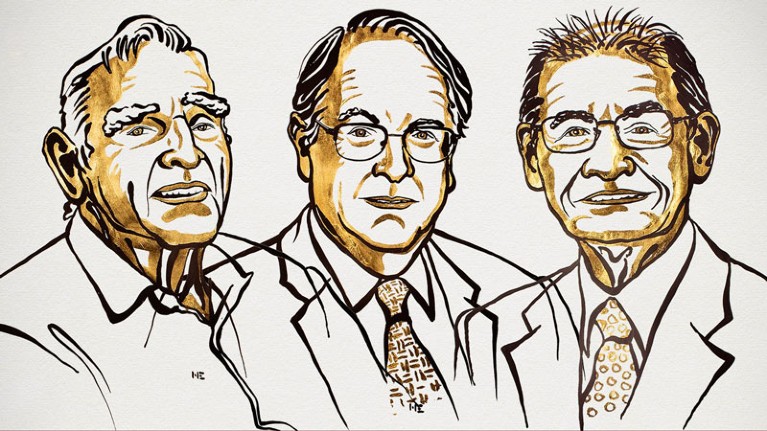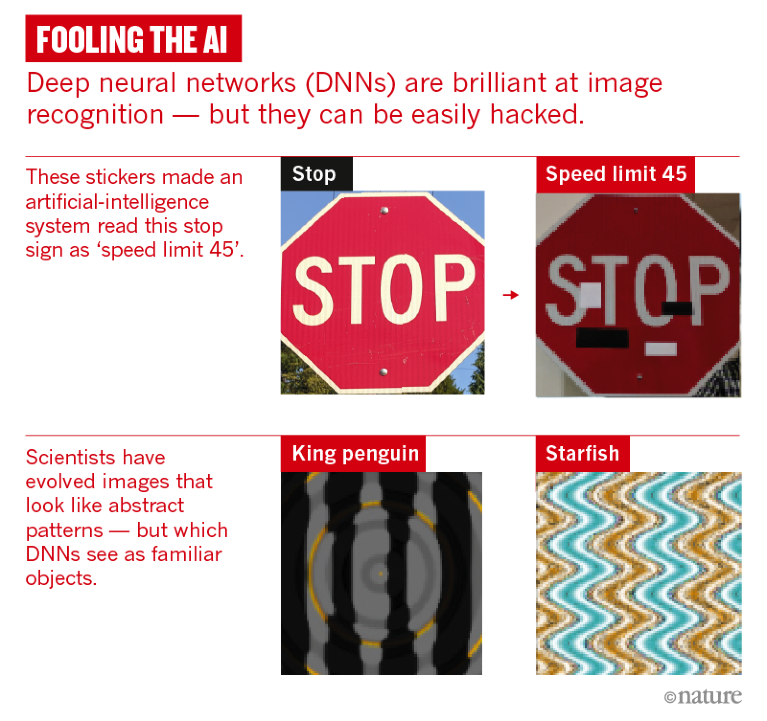Hello Nature readers, would you like to get this Briefing in your inbox free every day? Sign up here.

John Goodenough, Stanley Whittingham and Akira Yoshino did work in the 1970s and 1980s that led to lithium-ion battery.Credit: Niklas Elmehed/Nobel Media
Chemistry Nobel for world-changing batteries
The Nobel Prize in Chemistry has been awarded to John Goodenough, Stanley Whittingham and Akira Yoshino for the development of lithium-ion batteries. All three contributed to the development of the kind of lightweight, rechargeable batteries that power most of our gadgets — and make “possible a fossil fuel-free society”, the Nobel chemistry committee said. Goodenough, a solid-state physicist, becomes the oldest Nobel laureate ever at the age of 97.
Read John Goodenough’s own history of the technology and how it was prompted by the desire to move away from fossil fuels: How we made the Li-ion rechargeable battery (Nature Electronics)
Kids’ climate lawsuit to go before Alaska court
Alaska’s Supreme Court will hear arguments today to determine if a climate lawsuit brought by a group of young people can go to trial. The lawsuit aims to overturn a state law enacted in 2010 to promote fossil-fuel development. The Alaska case joins several other high-profile efforts to combat climate change by focusing on the legal rights of children, including a complaint submitted to the United Nations by a group including climate-strike founder Greta Thunberg and another that challenges the US government over rights enshrined in the US constitution.
Read more: Climate activists turn to lawsuits to force action on global warming (Nature, from July)
Top scientists sound no-deal Brexit alarm
Leading scientists in the United Kingdom are sending strong warnings about the chilling effect on science if the country leaves the European Union without agreements on funding and research collaborations. Top among their concerns is uncertainty about whether scientists will be able to access the huge pot of money known as Horizon Europe. “In science, a no-deal Brexit would be like a severe drought for an orchard. You can’t expect to have a harvest after watering it again next year. All the trees are already dead,” said Nobel laureate Andre Geim, who discovered graphene.
FEATURES & OPINION
Why deep-learning AIs are so easy to fool
Deep neural networks are part of daily life, running everything from automated telephone systems to your Netflix recommendations. Yet altering inputs — in the form of tiny changes that are typically imperceptible to humans — can flummox the best of them. And when they are piloting self-driving cars or diagnosing disease, that can lead to substantial problems.

Sources: Stop sign: Ref. 1; Penguin: Ref. 5
Chat with Nobel prizewinner Didier Queloz
Yesterday, astronomer Didier Queloz was awarded a share in the 2019 Nobel Prize in Physics for his research on exoplanets. Shortly after the announcement, reporter Benjamin Thompson went to chat to him about the discovery that led to the prize, and where his field is headed.
How to overcome impostor syndrome
The perfectionism developed by many scientists-in-training can fuel a tendency to amplify criticism over praise, writes neuroscientist and clinical psychologist Desiree Dickerson. She shares how she dials down her own self-doubt by developing a compassionate inner voice and challenging the behaviours — avoidance, procrastination — that feed the feeling of failure.
Don’t miss your PhD deadline
Crashed hard drives, printing snafus and writer’s block are among the hurdles to getting your hard-won PhD thesis submitted on time. “In 15 years of working with PhD candidates, I’ve never heard anyone say, ‘It was totally fine,’” says university research trainer Inger Mewburn. Those who have been through disasters, or have helped others to overcome them, share their top tips to get you through submission day.
